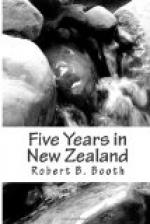The Rakaia bed, for example, is, or was, nearly half a mile wide, a vast expanse of shingle, full of treacherous quicksands, in which the course of the different streams is altered after every fresh. One might approach the Rakaia to-day and find it consist of three or four streams from twenty to one hundred yards wide, and not exceeding one to two feet in depth; to-morrow it might be a roaring sea a quarter of a mile in width, racing at a speed of five to ten miles an hour.
At the crossing of this river, accommodation houses were established at each side, both establishments providing expert men and horses who were constantly employed seeking for fords and conducting travellers across.
Nowadays, doubtless fine bridges, railways, and smart hotels have taken the place of what I am endeavouring to describe as the condition of things fifty years ago. The Rakaia is fifty miles from Christchurch, and that was our first day’s ride. The accommodation house on the north side was a weird-looking habitation, a long, low, single-storeyed desolate-looking building, partly constructed of mud and partly of green timber slabs rough from the forest, but it was, even so, a welcome sight after our long monotonous ride.
The house consisted of a small sitting-room or parlour for the better class of guests, not uncomfortably furnished, and about twelve feet square, two small bedrooms, a kitchen and a bar, the former serving for cooking purposes as well as a sitting and a bed-room for those travellers who could not afford the luxury or were not entitled to the dignity of the parlour. Separated a little way from this tenement was a long low shed used as a stable for such animals as their owners could afford to pay for so much comfort and a feed, in preference to the usual tussock and twenty yards of tether on the well-cropped ground around the hostelry.
It was a rough place, and a rough lot of characters were not unfrequently seen there. The Jack Tar just arrived from the bush or some up-country station with a cheque for a year’s wages, bent on a spree, and standing drinks all round while his money lasted, the Scottish shepherd plying liquor and grasping hands for “Auld Lang Syne,” the wretched debauched crawler, the villainous-looking “lag” from “t’other side,” the bullock puncher, whose every alternate word was a profane oath, the stockrider, in his guernsey shirt and knee boots with stockwhip thrown over his shoulder, engaging the attention of those who would listen with some miraculous story of his exploits, mine host smilingly dealing out the fiery poison, with now and again the presence of the dripping forder from the river, come in for his glass of grog and pipe before resuming his perilous occupation.
Smith and I put up in the parlour, and when we had dined and lit pipes proceeded to look after our horses, after which we paid a visit to the kitchen for a little hobnobbing with the motley assemblage collected there, and, of course, we stood liquor round in the usual friendly way. We soon retired, and ere long the kitchen floor, too, was covered with sleepers rolled in their blue or red blankets without which no colonist ever travelled.




